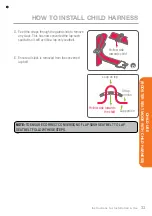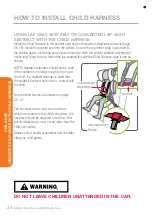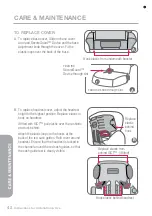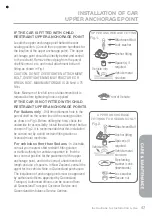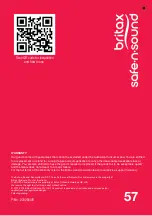
Instructions for Installation & Use
47
INSTALLATION OF CAR
UPPER ANCHORAGE POINT
IF THE CAR IS FITTED WITH CHILD
RESTRAINT UPPER ANCHORAGE POINT
Locate the upper anchorage point behind the rear
seating position. (Consult the car owners handbook for
the location of the upper anchorage point). The upper
anchorage point should be directly behind and central
to the restraint. Remove thread plug from the parcel
shelf/floor/roof, etc. and install attachment bolt and
fitting as shown in Fig 1.
CAUTION: DO NOT OVERTIGHTEN ATTACHMENT
BOLT. OVERTIGHTENING MAY FRACTURE OR
BREAK BOLT. MAXIMUM TORQUE IS 20 Nm(14.75
ft.lb.)
Note: Minimum of five full turns of attachment bolt is
required before tightening force is applied.
IF THE CAR IS NOT FITTED WITH CHILD
RESTRAINT UPPER ANCHORAGE POINTS
For Sedans only
- Drill 9mm diameter hole in the
parcel shelf on the centre line of the seating position
as shown in Fig 3. Before drilling the hole, check the
underside for accessibility. Install the attachment bolt as
shown in Fig 2. It is recommended that this installation
be carried out by a child restraint fitting station or
licenced motor mechanic.
For vehicles other than Sedans
- In Australia,
consult your nearest child restraint fitting station
or traffic authority for vehicle inspection to find the
best, correct position for the placement of the upper
anchorage point, and for the correct attachment bolt
length and use of spacers. In New Zealand, consult the
agent for the vehicle. Note to Queensland purchasers:
The installation of anchorage points must be approved
by authorised officers appointed by Queensland
Transport. Authorised officers can be sourced from
all Queensland Transport Customer Service and
Queensland Ambulance Service Centres.
Front of Vehicle
Attachment Bolt
Anchor fitting
Spacer(s) if
required
Vehicle metal
structure
Reinforcing
washer (cone
downwards).
Lock washer
Secure nut
UPPER ANCHORAGE
FITTINGS FOR SEDANS ONLY
Vehicle trim
UPPER ANCHORAGE FITTING
Attachment Bolt
Lock washer
Anchor fitting
Spacer(s) if
required
Vehicle metal
structure
Vehicle trim
Fig.1.
Fig.2.

